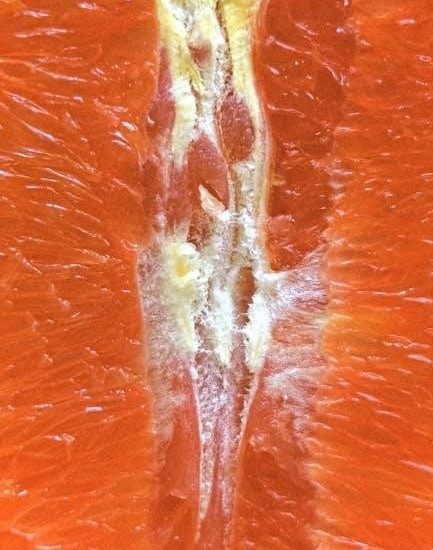A concussion diet focuses on optimizing nutrition to support brain healing and reduce symptoms. It emphasizes anti-inflammatory foods‚ high-quality proteins‚ and essential nutrients for recovery. This section explores how tailored nutrition can aid concussion recovery‚ providing a foundation for understanding the role of diet in healing the brain effectively.
1.1 Understanding the Importance of Nutrition in Concussion Recovery
Nutrition plays a cornerstone role in concussion recovery by providing the brain with essential energy and nutrients. After a concussion‚ the brain’s energy demands increase‚ requiring a balanced intake of proteins‚ vitamins‚ and minerals. Key nutrients like vitamins C‚ D‚ and E‚ along with magnesium and zinc‚ support neural repair and reduce oxidative stress. Early nutritional intervention can significantly enhance recovery‚ making it vital to prioritize a tailored diet during the healing process.
1.2 Overview of the Concussion Diet PDF
The Concussion Diet PDF serves as a comprehensive guide‚ outlining the best foods‚ meal plans‚ and hydration strategies for recovery. It emphasizes anti-inflammatory and antioxidant-rich foods‚ while advising against inflammatory and processed options. The guide provides practical tips for meal prep and highlights the importance of personalized nutrition. By following this structured approach‚ individuals can optimize their recovery process and reduce post-concussion symptoms effectively‚ ensuring a well-supported healing journey.

What is a Concussion?
A concussion is a mild traumatic brain injury caused by a head impact or force‚ leading to temporary brain dysfunction and requiring proper care and nutrition for recovery.
2.1 Definition and Causes of Concussion
A concussion is a type of traumatic brain injury caused by a blow to the head‚ a fall‚ or any injury that shakes the brain inside the skull. It disrupts normal brain function‚ often resulting in symptoms like dizziness‚ confusion‚ and memory issues. The injury is typically mild but can have significant effects‚ emphasizing the need for proper care and nutrition to aid recovery and reduce long-term impacts on cognitive function and overall health.
2.2 Symptoms and Effects on the Brain
A concussion often presents with symptoms like headaches‚ dizziness‚ confusion‚ memory issues‚ and fatigue. These effects stem from the brain’s disrupted function‚ impacting cognitive and emotional stability. The injury can alter normal brain activity‚ leading to challenges in concentration‚ mood swings‚ and sensitivity to light or sound. Understanding these symptoms is crucial for managing recovery and ensuring the brain heals properly‚ as prolonged effects can influence daily life and overall well-being if not addressed effectively.

The Role of Nutrition in Concussion Recovery
Nutrition plays a vital role in concussion recovery by providing the brain with essential nutrients to heal. A balanced diet supports energy production‚ reduces inflammation‚ and aids in repairing damaged neural pathways.
3.1 How the Brain Uses Energy After a Concussion
After a concussion‚ the brain’s energy demands increase as it works to repair itself. It relies heavily on glucose and specific nutrients like magnesium‚ zinc‚ and vitamins C‚ D‚ and E. A balanced diet ensures adequate calorie intake‚ as the brain typically uses 20% of daily calories‚ rising to 40% during recovery. Proper nutrition helps stabilize energy production‚ reducing fatigue and supporting neural repair.
3.2 Key Nutrients for Brain Healing
Key nutrients for brain healing after a concussion include proteins‚ omega-3 fatty acids‚ antioxidants‚ and essential vitamins and minerals. Proteins provide building blocks for cellular repair‚ while omega-3s reduce inflammation. Antioxidants like vitamins C and E combat oxidative stress‚ protecting brain cells. B vitamins support energy production‚ magnesium aids nerve function‚ and zinc promotes recovery. A diet rich in these nutrients helps restore brain health and alleviate post-concussion symptoms effectively.
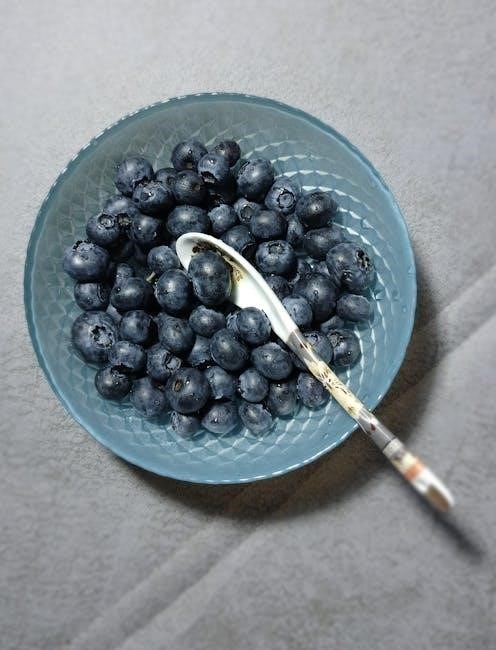
Essential Foods for Concussion Recovery
Eating nutrient-dense foods like leafy greens‚ berries‚ nuts‚ and fatty fish supports brain healing. These foods provide antioxidants‚ omega-3s‚ and vitamins crucial for recovery and symptom relief.
4.1 Anti-Inflammatory Foods
Anti-inflammatory foods are crucial for reducing swelling and promoting healing after a concussion. Incorporate foods like berries‚ nuts‚ and fatty fish‚ such as salmon‚ which are rich in omega-3s. Turmeric and ginger also have potent anti-inflammatory properties. These foods help minimize brain inflammation‚ alleviating symptoms like headaches and fatigue. By focusing on whole‚ unprocessed foods‚ you can create an environment that supports recovery and reduces oxidative stress‚ which is essential for brain health and healing.
4.2 High-Protein Foods for Brain Repair
High-protein foods are essential for brain repair after a concussion‚ as they provide the building blocks for cellular healing. Eggs‚ rich in choline‚ support brain health. Lean meats like chicken offer pure protein without excess fat. Fatty fish‚ such as salmon‚ deliver omega-3s to reduce inflammation. Greek yogurt and plant-based options like lentils and quinoa provide versatile protein sources. Grass-fed beef and nuts offer additional nutrients and antioxidants‚ aiding in recovery and overall brain function.
4.3 Foods Rich in Antioxidants
Foods rich in antioxidants are vital for reducing oxidative stress after a concussion. Berries like blueberries‚ raspberries‚ and strawberries are packed with antioxidants that protect brain cells. Leafy greens‚ such as spinach and kale‚ contain vitamins and minerals that support brain health. Nuts and seeds‚ including walnuts and flaxseeds‚ provide omega-3 fatty acids and antioxidants. Incorporating these foods helps combat inflammation and promotes faster recovery by shielding the brain from further damage.
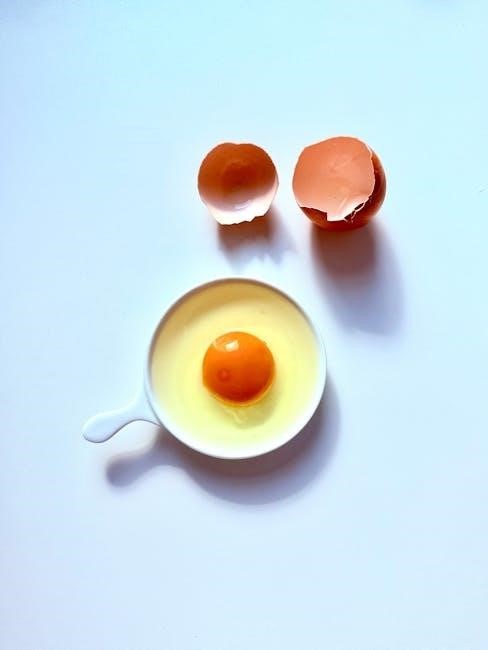
Foods to Avoid During Recovery
Avoid inflammatory and sugary foods‚ as they can hinder recovery by increasing inflammation and reducing nutrient absorption. Processed foods should also be minimized to support healing.
5.1 Inflammatory Foods
Inflammatory foods can worsen concussion symptoms and slow recovery. These include processed meats‚ fried foods‚ sugary snacks‚ and refined carbohydrates; Avoid alcohol and excessive caffeine‚ as they can dehydrate and irritate the brain. Eliminating these foods helps reduce inflammation and supports the brain’s healing process‚ promoting a smoother and faster recovery.
5.2 Sugary and Processed Foods
Sugary and processed foods can hinder concussion recovery by causing inflammation and energy crashes. These foods often lack essential nutrients and can deplete vital vitamins and minerals needed for healing. High sugar intake may worsen brain fog and fatigue‚ common post-concussion symptoms. Limiting or avoiding these foods helps maintain stable energy levels and supports the brain’s recovery process‚ promoting clearer thinking and reduced discomfort during healing.

Meal Planning and Preparation
Effective meal planning ensures a balanced concussion diet‚ focusing on brain-healing foods while avoiding harmful options. Structured preparation supports consistent nutrition‚ aiding recovery and reducing symptoms.
6.1 Creating a Balanced Concussion Diet Plan
A well-rounded concussion diet plan prioritizes nutrient-dense foods‚ including anti-inflammatory options‚ high-quality proteins‚ and antioxidant-rich ingredients. It avoids inflammatory and processed foods‚ ensuring optimal energy for brain healing. Balancing macronutrients and incorporating essential vitamins and minerals supports recovery. A structured plan helps maintain consistency‚ promoting faster healing and reducing post-concussion symptoms effectively.
6.2 Tips for Healthy Meal Prep
Plan meals in advance to ensure consistency and reduce decision fatigue. Focus on whole‚ nutrient-dense ingredients like lean proteins‚ vegetables‚ and whole grains. Prepare meals in bulk to save time and maintain a steady supply of brain-boosting foods. Incorporate anti-inflammatory and antioxidant-rich options‚ and keep healthy snacks on hand for quick energy. Staying hydrated with water and herbal teas is also crucial for optimal recovery and brain function.
The Role of Hydration
Proper hydration is essential for brain function and recovery. Water‚ herbal teas‚ and electrolyte-rich beverages help maintain cognitive health and prevent dehydration‚ which can worsen symptoms.
7.1 Importance of Water in Recovery
Water is crucial for brain function and cell repair after a concussion. Dehydration can worsen symptoms like headaches and fatigue‚ hindering recovery. Drinking enough water helps flush toxins and maintain electrolyte balance‚ supporting cognitive healing. Aim for 8-10 glasses daily‚ adjusting for activity levels and individual needs. Proper hydration ensures optimal brain health and accelerates the recovery process.
7.2 Herbal Teas and Electrolytes
Herbal teas‚ such as chamomile and peppermint‚ provide calming effects and antioxidants‚ aiding relaxation and cognitive recovery. Electrolytes like sodium and potassium are essential for maintaining proper hydration and nerve function‚ which are critical after a concussion. Incorporating electrolyte-rich beverages or supplements can help restore fluid balance and support the brain’s healing process‚ reducing symptoms like fatigue and dizziness during recovery.
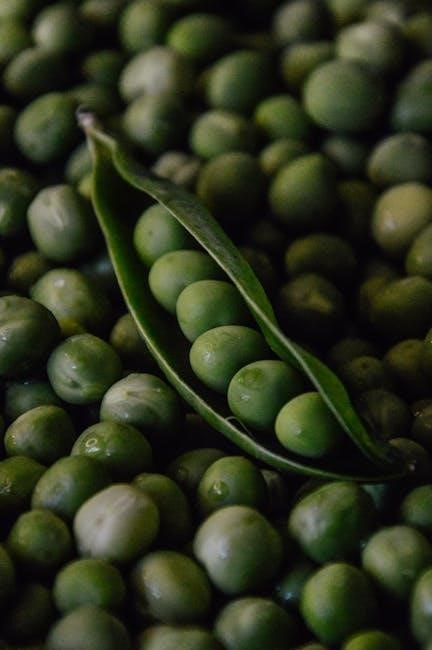
The Gut-Brain Connection
The gut-brain connection plays a crucial role in concussion recovery‚ as a healthy gut supports brain function and reduces inflammation. Nutrition tailored to gut health enhances overall healing and cognitive recovery‚ making it a vital component of a concussion diet plan.
8.1 How Gut Health Impacts Concussion Recovery
Gut health significantly influences concussion recovery by affecting brain function and inflammation levels. A healthy gut promotes anti-inflammatory responses‚ reducing brain swelling and oxidative stress. Nutrient absorption‚ essential for brain healing‚ relies on optimal gut function. A balanced diet rich in fiber and probiotics supports gut microbiota‚ enhancing the brain’s recovery process and overall well-being after a concussion.
8.2 Foods to Support Gut Health
Consuming foods that support gut health is crucial for concussion recovery. Fermented foods like yogurt and kefir provide probiotics‚ enhancing gut microbiota. Leafy greens‚ berries‚ and whole grains offer essential fiber‚ promoting a balanced digestive system. Omega-3 rich foods‚ such as fatty fish‚ reduce inflammation‚ while garlic and onions contain prebiotics that nourish beneficial gut bacteria‚ aiding in overall recovery and brain health.
Supplements and Vitamins
Key supplements like omega-3 fatty acids‚ vitamin D‚ magnesium‚ and zinc support brain healing. Antioxidants and CoQ10 reduce oxidative stress‚ while B vitamins enhance energy production and nerve repair.
9.1 Recommended Supplements for Concussion Recovery
Certain supplements can aid concussion recovery by addressing nutrient deficiencies and reducing inflammation. Omega-3 fatty acids‚ particularly EPA and DHA found in fish oil‚ support brain health. Magnesium and zinc are crucial for neuronal function and repair. Additionally‚ antioxidants like curcumin and CoQ10 help combat oxidative stress‚ while B vitamins support energy production and nerve repair. Always consult a healthcare provider before starting any supplement regimen to ensure safety and effectiveness.
9.2 Vitamins and Minerals to Boost Healing
Vitamins and minerals play a vital role in concussion recovery by supporting brain function and reducing oxidative stress. Vitamin C aids in neurotransmitter production‚ while vitamin D supports brain health. B vitamins‚ particularly B6‚ B9‚ and B12‚ are essential for energy production and nerve repair. Minerals like magnesium and zinc help regulate neuronal function and reduce inflammation. Ensuring adequate intake of these nutrients can promote faster and more effective healing after a concussion.
Personalizing Your Concussion Diet
Personalizing your concussion diet involves tailoring nutrition to individual needs‚ health conditions‚ and recovery progress. Adjusting the plan ensures optimal healing and addresses specific dietary preferences or restrictions effectively.
10.1 Considering Individual Nutritional Needs
Each person’s nutritional needs after a concussion can vary based on age‚ health conditions‚ and lifestyle. For example‚ athletes may require more protein and calories to support recovery‚ while individuals with dietary restrictions‚ such as gluten-free or vegan‚ need tailored plans. Additionally‚ micronutrients like magnesium and zinc‚ often depleted post-concussion‚ should be prioritized. Personalizing the diet ensures all nutritional gaps are addressed effectively.
10;2 Adjusting the Diet Based on Recovery Progress
As concussion symptoms improve‚ the diet can gradually shift to include more complex foods. Initially‚ focus on anti-inflammatory and easily digestible options. As energy levels and cognitive function increase‚ introduce nutrient-dense meals to support ongoing healing. Stay hydrated and monitor tolerance to each food. Adjustments should align with individual progress‚ ensuring the diet remains balanced and tailored to specific needs throughout the recovery journey.
Exercise and Nutrition Combination
Balancing exercise with a concussion diet supports recovery by enhancing physical and cognitive healing. It’s crucial to avoid overexertion and time meals appropriately to prevent discomfort.
11.1 Role of Physical Activity in Recovery
Physical activity plays a vital role in concussion recovery by improving brain function and overall well-being. Gentle exercises‚ like walking or yoga‚ can prevent physical deconditioning and enhance cognitive recovery. However‚ it’s crucial to avoid overexertion and follow a gradual return-to-exercise plan. Consulting a healthcare provider ensures activities are safe and tailored to individual recovery stages‚ promoting healing without worsening symptoms.
11.2 Timing Meals with Exercise
Timing meals with exercise is crucial for energy and recovery. Eat a balanced meal with complex carbs and lean protein 1-2 hours before exercise to maintain energy levels. post-workout‚ opt for protein-rich foods and antioxidants to aid muscle repair and reduce inflammation. Staying hydrated with water or electrolyte-rich beverages is also essential. Proper meal timing supports physical activity and enhances recovery‚ ensuring the brain and body receive the necessary nutrients for optimal healing.

Tracking Progress and Adjustments
Monitoring symptoms and adjusting the diet plan as needed is crucial. Seek professional guidance if symptoms persist or worsen to ensure proper recovery.
12.1 Monitoring Recovery Through Diet
Monitoring recovery through diet involves tracking symptoms and adjusting nutritional intake. Focus on consuming anti-inflammatory foods‚ high-protein meals‚ and antioxidant-rich options to support healing. Keep a food diary to identify triggers or improvements. Regularly assess energy levels‚ cognitive function‚ and overall well-being. Adjust the diet plan based on progress‚ ensuring adequate hydration and nutrient balance. A balanced diet tailored to individual needs can significantly enhance recovery outcomes and reduce lingering symptoms effectively.
12.2 When to Seek Professional Guidance
Seek professional guidance if symptoms persist or worsen despite dietary efforts. Consult a neurologist or dietitian for personalized advice‚ especially if experiencing severe cognitive issues or prolonged recovery. They can help tailor your diet to specific needs and address nutritional deficiencies. Professional input is crucial for complex cases or when self-managed strategies are insufficient‚ ensuring optimal recovery and addressing any underlying health concerns effectively.
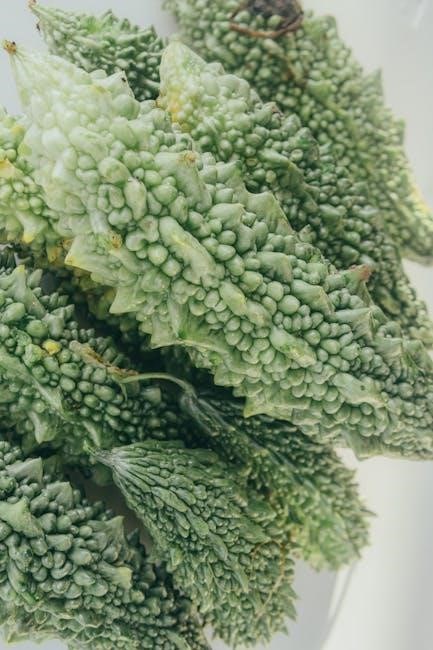
Common Mistakes to Avoid
Avoid ignoring anti-inflammatory foods and overconsuming processed sugars‚ as these can hinder recovery. Skipping meals or neglecting nutrient-rich foods may slow healing and worsen symptoms.
13.1 Overconsumption of Certain Foods
Overeating inflammatory or processed foods can impede recovery by causing inflammation and reducing nutrient absorption. High sugar intake may worsen brain fog and fatigue‚ slowing healing. Avoid excessive caffeine and alcohol‚ as they can dehydrate and exacerbate symptoms. Balancing the diet with whole‚ nutrient-dense foods supports optimal recovery and minimizes setbacks. Moderation is key to avoiding these common pitfalls.
13.2 Ignoring Nutritional Deficiencies
Neglecting essential vitamins and minerals can hinder recovery. Concussions often deplete nutrients like magnesium‚ zinc‚ and B vitamins‚ crucial for brain function. Ignoring these deficiencies may prolong symptoms like fatigue and cognitive fog. Ensuring adequate intake through diet or supplements is vital for healing. Regular monitoring and tailored nutrition plans can prevent deficiencies‚ promoting a faster and more effective recovery from concussion-related challenges. Awareness and proactive nutrient management are essential.

Sample Concussion Diet Recipes
14.2 Lunch and Dinner Options
Grilled chicken‚ fish‚ and vegetables are excellent lunch and dinner choices. Incorporate anti-inflammatory herbs‚ healthy fats‚ and whole grains to support brain healing and overall recovery effectively.
14.1 Breakfast Ideas
Start your day with brain-boosting breakfasts like scrambled eggs with spinach‚ avocado toast‚ or a smoothie with berries‚ spinach‚ and almond milk. These options provide essential nutrients‚ antioxidants‚ and healthy fats to support cognitive recovery. Incorporate whole grains like oatmeal for sustained energy and add nuts or seeds for omega-3 fatty acids‚ which aid in reducing inflammation and promoting brain health after a concussion. These meals are easy to prepare and packed with healing properties.
For lunch and dinner‚ opt for balanced meals like grilled salmon with quinoa and steamed vegetables‚ or lean turkey with roasted sweet potatoes and green beans. These dishes provide omega-3 fatty acids‚ antioxidants‚ and fiber‚ which support brain health and reduce inflammation. Incorporate lean proteins‚ whole grains‚ and a variety of colorful vegetables to ensure a nutrient-rich diet that aids in concussion recovery and overall well-being.
14.3 Healthy Snacks
Healthy snacks like nuts‚ seeds‚ and fresh fruits provide essential nutrients for brain health. Opt for walnuts‚ blueberries‚ or bananas to boost antioxidants and omega-3 fatty acids. Veggie sticks with hummus or avocado slices are excellent anti-inflammatory options. Protein-rich snacks such as hard-boiled eggs or Greek yogurt support brain repair. These snacks are easy to prepare‚ nutritious‚ and help maintain energy levels during concussion recovery without causing inflammation or digestive discomfort.
A well-planned concussion diet rich in anti-inflammatory foods‚ antioxidants‚ and essential nutrients supports brain healing and reduces symptoms. Proper nutrition‚ combined with rest and hydration‚ aids recovery effectively.
15.1 Final Thoughts on Concussion Diet
Adopting a concussion diet is a proactive step toward recovery‚ emphasizing nutrient-dense foods to support brain health. By focusing on anti-inflammatory and antioxidant-rich options‚ individuals can enhance healing and reduce symptoms. Consistency and personalized nutrition plans are key‚ ensuring long-term benefits and improved cognitive function.
15.2 Encouragement for Long-Term Recovery
Recovery from a concussion is a journey that requires patience and dedication. By committing to a nutrient-rich diet‚ staying hydrated‚ and avoiding inflammatory foods‚ you can support your brain’s healing process. Celebrate small milestones and remember‚ progress takes time. With persistence and the right nutritional strategies‚ you can achieve lasting improvement and regain your overall well-being.

